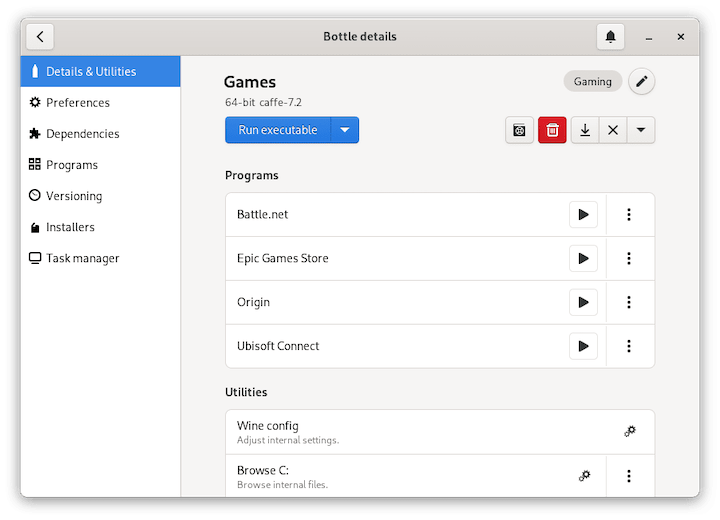How To Install Bottles on Manjaro

Bottles is a powerful tool for managing Windows applications and games on Linux systems. This guide will walk you through the process of installing Bottles on Manjaro, a popular Arch-based Linux distribution. We’ll cover multiple installation methods, troubleshooting tips, and best practices to ensure you get Bottles up and running smoothly on your Manjaro system.
What is Bottles?
Bottles is an advanced Wine prefix manager that simplifies the process of running Windows software on Linux. It provides a user-friendly interface for creating and managing Wine environments, installing Windows dependencies, and configuring various settings to optimize compatibility and performance.
Installation Methods
There are several ways to install Bottles on Manjaro. We’ll cover the three most common methods: Flatpak, AUR, and building from source.
1. Installing Bottles via Flatpak
The Flatpak version of Bottles is the most supported and tested release. It’s also fully sandboxed, providing an extra layer of security. Here’s how to install Bottles using Flatpak:
- Open a terminal window.
- Enable Flatpak support in Manjaro if you haven’t already:
sudo pacman -S flatpak - Add the Flathub repository:
flatpak remote-add --if-not-exists flathub https://flathub.org/repo/flathub.flatpakrepo - Install Bottles:
flatpak install flathub com.usebottles.bottles - Once installed, you can launch Bottles from your application menu or by running:
flatpak run com.usebottles.bottles
2. Installing Bottles from AUR
Bottles is also available in the Arch User Repository (AUR). While this method is not officially recommended by the Bottles developers, it can be useful for users who prefer to manage all their packages through the AUR.
- Ensure you have an AUR helper installed, such as
yayorparu. If not, you can installyaywith:sudo pacman -S yay - Install Bottles using your AUR helper:
yay -S bottles - Launch Bottles from your application menu or by running
bottlesin the terminal.
3. Building Bottles from Source
For advanced users who want the latest features or need to customize their installation, building Bottles from source is an option.
- Install the required dependencies:
sudo pacman -S git flatpak-builder - Clone the Bottles repository:
git clone https://github.com/bottlesdevs/Bottles.git cd Bottles - Build and install Bottles:
flatpak-builder --repo=bottles --force-clean --user build-dir com.usebottles.bottles.yml flatpak remote-add --user bottles bottles --no-gpg-verify flatpak install --user bottles com.usebottles.bottles - Run Bottles:
flatpak run com.usebottles.bottles
Post-Installation Setup
After installing Bottles, there are a few additional steps you should take to ensure optimal performance:
1. Update Bottles
Ensure you’re running the latest version of Bottles by updating it regularly. For Flatpak installations, use:
flatpak update com.usebottles.bottles2. Install Required Dependencies
Bottles may require additional dependencies to function properly. Install these as needed:
sudo pacman -S wine winetricks3. Configure Graphics Drivers
For the best gaming performance, ensure your graphics drivers are up-to-date and properly configured.
Using Bottles
Now that Bottles is installed, let’s explore how to use it effectively:
1. Creating a New Bottle
- Launch Bottles from your application menu.
- Click on the “+” button to create a new bottle.
- Choose a name and environment type (e.g., Gaming, Software, Custom).
- Select the appropriate runner version and architecture.
- Click “Create” to set up your new bottle.
2. Installing Windows Applications
- Select your bottle from the main Bottles interface.
- Click on the “Run Executable” button.
- Navigate to your Windows installer file and select it.
- Follow the installation prompts as you would on a Windows system.
3. Managing Bottles
Bottles provides various tools for managing your Windows environments:
- Dependencies: Install common Windows libraries and components.
- Programs: View and manage installed applications.
- Preferences: Adjust bottle-specific settings.
- Task Manager: Monitor running processes within the bottle.

Troubleshooting Common Issues
While Bottles generally works well on Manjaro, you may encounter some issues. Here are solutions to common problems:
1. Bottles Fails to Launch
If Bottles doesn’t open or crashes on startup, try the following:
- Ensure all dependencies are installed:
sudo pacman -S python-gobject gtk3 libadwaita - Reinstall Bottles:
flatpak reinstall com.usebottles.bottles - Check for missing Python modules:
flatpak run --command=python3 com.usebottles.bottles -c "import sys; print('\n'.join(sys.path))"
2. Application Compatibility Issues
If a Windows application isn’t running correctly:
- Try different Wine versions within Bottles.
- Install additional Windows dependencies through the Bottles interface.
- Check the Bottles documentation and community forums for application-specific tips.
3. Performance Problems
To improve performance of Windows applications running through Bottles:
- Enable DXVK for DirectX applications.
- Adjust the virtual desktop resolution in the bottle settings.
- Experiment with different Wine versions and staging patches.
Congratulations! You have successfully installed Bottles. Thanks for using this tutorial for installing Bottles on your Manjaro system. For additional or useful information, we recommend you check the official Bottles website.